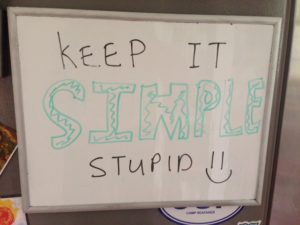Keeping it Simple
 Simple Instructions, simple tasks
Simple Instructions, simple tasks
Do you ever feel like you sound like a broken record? I know that I do. I often cringe listening to myself rhyme off reminders: “Brush your teeth.” “Don’t forget your homework.” “Take the garbage out.” Yet, the fabric of our routine and the hum of our household co-exist within these simple tasks.
I am tend to repeat idioms. Chances are you can read one on my fridge on any given day. “Don’t sweat the small stuff.” “What goes around comes around.” “Practice makes perfect.” These phrases so often encapsulate the core message I am trying to share that I admit I may sound a bit trite at times.
Ultimately, however, I have learned that my success, both as a parent and as a consultant, depends on how closely I follow the KISS principle. “KEEP IT SIMPLE STUPID.” Time and again I find myself falling back on this concept. It helps guide my decision making; it helps me correct course when things aren’t working out. It seems that following KISS often leads to “things falling into place”!
Mired in the Weeds
I recently got mired in the weeds writing a phone contract for my son. Before undertaking this project I read lots of other contracts. I borrowed the best of each, and wrote up what I thought was an airtight set of rules for managing his phone. This original contract was long on substance but short on enforceability. It was far too prescriptive and, as a result, in the real world of crazy family living, elements were broken without consequence. It was too complicated to enforce consistently, so was not effective when needed.
His new contract boils down to FIVE principles. The heart of which is that it is my phone and that I can do what I want with it, when I want, except he is responsible for paying for any repairs. I don’t think it could be simpler. Simple but effective. I can bring any transgression back to the contract and he can’t really argue with me.
The best thing about the new contract is how uncomfortable it makes my son. He can see how easy it is to enforce and that I mean business. He was much more comfortable stewing down in the weeds than exposed out of them!
Simple Does not Mean Easy
Consulting tools and solutions need to follow this same principle. In my experience, any time a project or report is getting too complicated it is probably time to step back and simplify it. Now believe me, this is harder than it sounds. Gathering information and over-analyzing it is often a lot easier than distilling its core message.
The irony of this is that smart clients often try to pull consultants down into the weeds. Just like my overly complicated phone contract, it is sometimes more comfortable arguing about picky details than identifying and solving REAL problems.
Until you distill your core – SIMPLE – message, it is usually difficult to figure out how to solve a problem. Make your clients and kids uncomfortable: fall back on simple, and see how much easier it is to manage results and realize desired outcomes.


